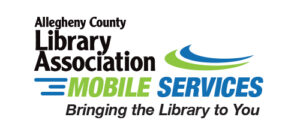OUR HISTORY

Bookmobiles first started providing service in Allegheny County in 1952. The program started out of the Carnegie of Pittsburgh Library in Oakland, providing City Service with 2 vehicles throughout the city. Branches were located in some of the sites visited by the City Bookmobile, ultimately leading to the demise of the City Service.
In the late 1950’s, the Allegheny County Government wanted to pay for library services in the county, and ultimately funded additional bookmobile service throughout the county, using 3 vehicles. The success of the program led to the development of stationary libraries in many communities around the county.

In the mid 1960’s, the bookmobile service was relocated to the West End, next to the West End Branch. Facilities were built specifically for the needs of the collection, staff and vehicles. At this time, all service was outside of the City of Pittsburgh, and the access to major roads made the West End a better hub than Oakland.


A new bookmobile that was accessible to older adults with physical limitations was put into service in 2002. The bookmobile was easily accessible by wheelchair or walker via a ramp, and additionally had shallow steps at the rear for ease of boarding and exiting. After a study of the service was conducted in the late 2000’s, a new vehicle was purchased and the program was transitioned to a lobby service in 2012, effectively removing all barriers to use of the bookmobile. This service has expanded to nearly 40 sites, including senior centers, senior high- rises, independent and assisted living facilities.
In 2001, the County announced it would no longer be able to fund the bookmobile. Throughout 2001-2002, alternative sources of funding were explored, with the Regional Asset District and Citizen’s Bank being the main support in 2002-2003. Beginning in 2003, administration of bookmobile services was taken over from the Carnegie Library of Pittsburgh by the Allegheny County Library Association. General library service by the bookmobile to local communities became fee-based, and 7 stops were funded. The remaining 15 stops from the general library routes were cancelled.

The mission of providing direct library service to unserved and underserved communities in Allegheny County continues to today. Fee-based service remains a viable aspect of the Mobile Library Services, while the main focus is directed to the special, niche services to preschools, Head Start programs and senior citizens.


